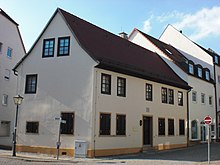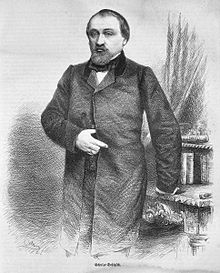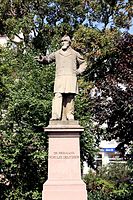Hermann Schulze-Delitzsch
Hermann Schulze-Delitzsch , actually Franz Hermann Schulze (born August 29, 1808 in Delitzsch ; † April 29, 1883 in Potsdam ), was a German social reformer , lawyer and politician .
Alongside Eduard Pfeiffer , Victor Aimé Huber , Karl Korthaus , Wilhelm Haas and Friedrich Wilhelm Raiffeisen, Schulze is one of the leading founding fathers of the German cooperative system and was the most important protagonist of the commercial cooperative organization.
Schulze-Delitzsch only got his double name in connection with his function as a member of the Prussian National Assembly in 1848. Due to the widespread family name, he wanted to avoid confusion with other members of parliament in this way.
Life
Youth and education
Hermann Schulze-Delitzsch was born on August 29, 1808 as the first son of the mayor at the time, Justizrat August Wilhelm Schulze (1779–1861) and his wife Wilhelmine Schulze, née. Schmorl (1784–1866) was born in Markt 11 in Delitzsch . He grew up in a middle-class and achievement-oriented family. A few days after his birth he was baptized by the deacon Theophilus August Mohring. Of his nine siblings, only the three brothers Rudolf Schulze (1812–1860), Wilhelm Schulze (1814–1843) and Heinrich Schulze (1817–1871) reached adulthood. In later life he had hardly any closer contact with them, partly because they lived far apart.
For the period 1814 to 1821 is not known exactly whether the Schulze far from his birthplace located Bürgerschule visited or home schooling received. From October 1821 he began his higher education financed by his parents at the Alte Nikolaischule in Leipzig , which he completed in the spring of 1827. According to family tradition, Schulze enrolled in the law faculty of the University of Leipzig in 1827 . The progressive reform policy and the emerging career opportunities in the Kingdom of Prussia probably led him to continue his law studies outside the Kingdom of Saxony at the University of Halle from May 18, 1829. In 1827 he joined the Leipzig fraternity , of which he was a member of the board of directors. Since fraternities were under the observation of government representatives, Schulze finished his studies.
Working life
In 1838 he was appointed higher regional court assessor and then worked at the higher regional court in Naumburg and at the Berlin higher court .
From 1841 to 1849 he worked as a patrimonial judge for several manor districts in his home town of Delitzsch. Thereby he got to know the problems of the small craft businesses in the country, which could not keep up with the advancing industrialization . After a bad harvest in 1846, he helped found an aid committee for the procurement of grain and the maintenance of a mill and a bakery. His social commitment was probably not without influence on the fact that he was elected to the Prussian National Assembly in 1848 as a left-liberal member of the Delitzsch and Bitterfeld districts. Since then his family name was the corresponding parliamentary habits origin added designation: Schulze-Delitzsch . In fact, Schulze lived in Delitzsch until 1861, then in Potsdam until his death.
Contribution to the cooperative idea
In the Prussian National Assembly, he participated in commissions that dealt with the situation of traders. There he came to the conclusion that the situation of the craftsmen could only be improved by enabling them to catch up with the rapidly developing industry through cooperative associations.
Because of the reaction after the failed revolution of 1848 he was prevented from any political activity. He therefore resigned from civil service in order to devote himself to spreading the cooperative idea. During this time, Schulze-Delitzsch was in lively correspondence with the Eilenburg doctor Anton Bernhardi , who also developed and began to implement specific ideas for establishing cooperative organizations. Bernhardi's work had a not insignificant influence on Schulze-Delitzsch. In Delitzsch and Eilenburg, the first cooperatives were established around the same time.

With the establishment of a shoemaker cooperative in Delitzsch 1849 Schulze-Delitzsch had the cooperative as a corporate legal form justified. Now he propagated savings and consumer associations to guarantee livelihoods, advance and credit associations (today's Volksbanks ) to raise money for investments and the establishment of distributive and production cooperatives. Apart from the idea of the production cooperatives, he was so successful with it that he was able to create the general association of self-help German trade and business cooperatives as an umbrella organization . The system of its cooperatives was based on joint and several liability , the acquisition of cooperative shares, the limitation of all benefits to the cooperatives and the refusal of direct support from the state. This idea of self-help and self-responsibility , he defended in disputes with Friedrich Wilhelm Raiffeisen and Ferdinand Lassalle .
At the first congress of German economists in Gotha in 1858 he was one of the speakers and his economic policy guidelines were adopted by the congress. At the end of the congress, the general assembly elected him to the "permanent deputation" of the congress.
MP and last years
In 1859 he was elected to the Prussian House of Representatives, in 1861 he was one of the founders of the German Progressive Party and moved with his family to Potsdam. As state assembly and - since 1867 - member of parliament he set the cooperative law in Prussia and shortly thereafter just such also in the North German Confederation through, making the cooperatives were given a legal basis and as a legal person , the legal capacity received. He did not live to see the introduction of the Germany-wide cooperative law (1889).
In 1871 he was elected to the German Reichstag - he retained the mandate until his death. In the Reichstag, he campaigned for a democratic right of association and assembly with several - rejected - bills . 1873, he was from the University of Heidelberg , the honorary doctorate awarded. He was a member of the Freemason Lodge for Resistance in Berlin, a subsidiary of the Great State Lodge of the Freemasons of Germany .
Schulze-Delitzsch died on April 29, 1883 at the age of 75. On May 3rd, a memorial service was held in front of 150 guests in the garden hall of the Reichstag in the presence of his family. Then a team of horses led the coffin, accompanied by over 10,000 people, to the old city cemetery in Potsdam.
Awards and recognitions
Schulze-Delitzsch was awarded a high degree of recognition and admiration during his lifetime. Shortly after he began his political activities, Ernst Keil published a comprehensive biography of him in his monthly newspaper Der Leuchtthurm in 1850 . On the recommendation of Johann Caspar Bluntschli , he was awarded the honorary doctorate Doctor Juris honoris causa on November 17, 1873, with the approval of the Law Faculty of the University of Heidelberg , for his services to the new legal education of the economic cooperatives.
After his death, bronze monuments were erected on the Marienplatz in Delitzsch on September 13, 1891 and on August 4, 1899 on the Schulze-Delitzsch-Platz (name from 1910) in Berlin's Luisenstadt . The statue in his hometown was created by Edwin Weißenfels , but had to be melted down in 1944 due to the obligation to deliver metal for armaments purposes during World War II . A replica of shell limestone that still exists today was made in 1950 by the sculptor Max Alfred Brumme . The memorial was made in Berlin by the sculptor Hans Arnold . In the early 1970s, the GDR leadership had Schulze-Delitzsch-Platz renamed Inselplatz and the monuments in Berlin and Delitzsch and the tomb in Potsdam removed for political and ideological reasons. The dismantling and subsequent storage were justified with building projects. The Delitzsch monument was moved to the city park and a memorial to the first GDR President Wilhelm Pieck was erected in its place . At the urging of the West German cooperatives, the tomb was erected again in 1983/84. The monuments were restored and returned to their original locations in 1991 and 1992 respectively.
On August 7, 2008, on the occasion of his 200th birthday, Deutsche Post published a 90-cent special postage stamp . On it was a portrait and a quote from Schulze: “The spirit of the free cooperative is the spirit of modern society.” On August 7, 2008, there was a special postmark for the first day in Bonn and Berlin and a special postmark in Delitzsch. The German Cooperative Association had a representative portrait made of Carl Obenland , which shows the cooperative idea generator in old age. The association also donated the Schulte Delitzsch Medal, which was awarded to well-deserved cooperative personalities until 1971. Since then, the German cooperative organization has awarded the Raiffeisen / Schulze-Delitzsch medal .
Accordingly, two vocational schools also bear the name Schulze-Delitzschs. These include the commercial vocational school in Wiesbaden and the vocational school center in Delitzsch. In connection with the Landau horticultural show in the Palatinate in 2015 , the Schulze-Delitzsch-Carrée was created from 2012 to 2015 , an architecturally sophisticated building ensemble as an anchor point for a new district.
The Dr. On November 29, 2013, the Hermann-Schulze-Delitzsch-Gesellschaft and Friedrich-Wilhelm-Raiffeisen-Gesellschaft jointly submitted a transnational application in the federal states of Saxony and Rhineland-Palatinate to include the “ cooperative idea ” in the nationwide directory of intangible cultural heritage (created in Within the national implementation of the UNESCO Convention for the Preservation of Intangible Cultural Heritage). In December 2014, this application was approved by the Conference of Ministers of Education and Cultural Affairs and submitted on March 27, 2015 as the first German nomination to UNESCO for international listing. On November 30, 2016, the intergovernmental committee of UNESCO, during its 11th meeting in Addis Ababa , decided to be included in the representative list of the intangible cultural heritage of mankind .
Others
In addition to his legal and political work, Schulze-Delitzsch also wrote poems as a younger man, which he had published under the name Hermann Schulz in 1838 by Brockhaus in Leipzig. He gave a copy of his collection of poems to the then nineteen-year-old apprentice pharmacist Theodor Fontane , who was doing an apprenticeship in the Berlin pharmacy “Zum Weißen Schwan” and working there with a brother of Schulze-Delitzsch. Fontane was particularly fascinated by the song of the outlaw , which he vividly remembered 50 years later in his memories From Twenty to Thirty .
literature
- Acta Borussica Volume 5 (1858–1866) ( Memento from January 21, 2010 in the Internet Archive )
- Rita Aldenhoff: Schulze-Delitzsch . Baden-Baden 1984.
- Rita Aldenhoff-Hübinger: Schulze-Delitzsch, Franz Hermann. In: New German Biography (NDB). Volume 23, Duncker & Humblot, Berlin 2007, ISBN 978-3-428-11204-3 , p. 731 f. ( Digitized version ).
- Uwe Birnstein , Georg Schwikart : Friedrich Wilhelm Raiffeisen and Hermann Schulze-Delitzsch - Cooperative against need. Wichern Verlag, Berlin 2014, ISBN 978-3-88981-356-5 .
- Walter Braeuer : Cohn, Gustav. In: New German Biography (NDB). Volume 3, Duncker & Humblot, Berlin 1957, ISBN 3-428-00184-2 , p. 315 f. ( Digitized version ).
- Marvin Brendel: Hermann Schulze-Delitzsch. Selected writings and speeches by the founding father of the cooperatives (= founding times . Volume 1 ). Schaltzeit-Verlag, Berlin 2008, ISBN 978-3-941362-01-7 , p. 258 .
- Helge Dvorak: Biographical Lexicon of the German Burschenschaft . Volume I: Politicians. Sub-volume 5: RS . Heidelberg 2002, p. 363-365 .
- Karl Theodor von Eheberg : Schulze, Hermann, called Schulze-Delitzsch . In: Allgemeine Deutsche Biographie (ADB). Volume 33, Duncker & Humblot, Leipzig 1891, pp. 18-29.
- Eckhard Hansen, Florian Tennstedt (Eds.) U. a .: Biographical lexicon on the history of German social policy from 1871 to 1945 . Volume 1: Social politicians in the German Empire 1871 to 1918. Kassel University Press, Kassel 2010, ISBN 978-3-86219-038-6 , pp. 145 f. ( Online , PDF; 2.2 MB).
- Harald Lönnecker : "Arrived in Leipzig, accepted as a little fox" - connections and associations at the University of Leipzig in the long 19th century . In: Jens Blecher, Gerald Wiemers (ed.): The register of the University of Leipzig . Teilbd. II: The years 1833 to 1863 . Weimar 2007, p. 13-48 .
- Edmund Schreiber: Hermann Schulze-Delitzsch . In: Central German Life Pictures . 1. Volume: Pictures of the 19th Century . Magdeburg 1926, p. 195-208 .
- Manfred Wilde : Schulze as an educated citizen and reform politician by origin? On social character and professional activity up to the beginning of his political activity (= series of publications by the Förderverein Hermann Schulze-Delitzsch and Memorial of the German Cooperative Society, issue 14). 2008, ISSN 1615-181X , p. 66 .
- Manfred Wilde : Schulze as patrimonial judge from 1841 to 1848 . In: Hermann Schulze-Delitzsch. Way-work effect. Festschrift for the 200th birthday on August 29, 2008 . Wiesbaden 2008, ISBN 978-3-87151-111-0 , pp. 168-183 .
- Manfred Wilde : Episodes around Hermann Schulze-Delitzsch. The economist and founder of a cooperative . Tauchaer Verlag, Taucha 2008, ISBN 978-3-89772-139-5 .
- Wilhelm Kaltenborn : Hermann Schulze-Delitzsch and the Social Question, Volume 11 . Förderverein Hermann Schulze-Delitzsch and Memorial of the German Cooperative System , 2006, ISSN 1615-181X , p. 108 .
Web links
- Literature by and about Hermann Schulze-Delitzsch in the catalog of the German National Library
- Hermann Schulze-Delitzsch in the database of members of the Reichstag
- Entry for the Schulze-Delitzsch monument in the Berlin State Monument List
- Biography on genossenschaftsgeschichte.info
- Theodor Fontane job, pictures and information on Schulze-Delitzsch and Theodor Fontane
Individual evidence
- ^ Wilde: Episodes around Hermann Schulze-Delitzsch . 2008, p. 43.
- ^ Wilde: Episodes around Hermann Schulze-Delitzsch . 2008, pp. 44-45.
- ^ Wilde: Episodes around Hermann Schulze-Delitzsch . 2008, p. 8.
- ^ Otto Ruhmer: History of the origins of the German cooperative system. (= Cooperative and social library , volume 1.) Johs. Krögers printing and publishing house, Hamburg-Blankenese 1937.
- ^ Gerhard Eisfeld: The emergence of the liberal parties in Germany , Verlag für Literatur und Zeitgeschehen, Hannover 1969, p. 20.
- ↑ Collection of sources on the history of German social policy from 1867 to 1914 . I. Department: From the time when the Empire was founded to the Imperial Social Message (1867–1881) , Volume 4: Workers' Law , edited by Wolfgang Ayaß , Karl Heinz Nickel and Heidi Winter, Darmstadt 1997, pp. 6, 8, 15, 20, 30– 37, 39, 44-47, 68, 85, 91 f., 99, 105 f., 108, 111, 124, 129-134, 137, 238–241, 243 f., 248-253, 256 f., 259, 261-263, 267, 277 f., 284, 286-288, 292-294, 305, 337, 457, 467, 471-474, 481, 487, 489, 661.
- ↑ a b Wilde: Episodes around Hermann Schulze-Delitzsch . 2008, p. 69.
- ^ Sigrid Schmidt, Christel Moltrecht: Cityscapes from Delitzsch . 1992, ISBN 3-928741-16-0 , p. 38.
- ^ Wilde: Episodes around Hermann Schulze-Delitzsch . 2008, pp. 71/73.
-
^ Wilde: Episodes around Hermann Schulze-Delitzsch . 2008, p. 71.
Schulze-Delitzsch-Platz. In: Street name lexicon of the Luisenstädtischer Bildungsverein (near Kaupert ) - ↑ http://www.stiftung-giz.de Collection of the GIZ Foundation Genossenschaftshistorisches Informationszentrum Berlin : Information on the painting in the GenoFinder online database under signature: EX-00850
-
^ Raiffeisen / Schulze-Delitzsch Medal in Gold ( Memento from December 14, 2012 in the Internet Archive ) from 2001, accessed on July 11, 2011.
Lederer receives the Raiffeisen / Schulze-Delitzsch Medal in gold. In: geldinstitute.de. June 18, 2014 . - ^ VR Bank Südpfalz: Das Schulze-Delitzsch-Carrée ( Memento from April 27, 2015 in the Internet Archive ), accessed on December 15, 2014.
- ↑ The cooperative idea and practice was the first German contribution to be included in the UNESCO list of intangible cultural heritage. In: Unesco.de. Retrieved December 1, 2016 .
- ↑ Admission procedure: Process for the recognition of a cultural form of expression as an intangible cultural heritage in Germany. on: unesco.de
- ↑ Cooperative idea nominated. on the website of the state government of Rhineland-Palatinate, accessed on December 15, 2014.
- ^ Daniel Römer [i-fabrik GmbH]: News. In: www.delitzsch.de. Archived from the original on December 2, 2016 ; accessed on December 2, 2016 .
- ^ Idea and practice of organizing shared interests in cooperatives - intangible heritage - Culture Sector - UNESCO. In: www.unesco.org. Retrieved December 1, 2016 .
- ^ Hermann Schulz: Wanderbuch. A poem in scenes and songs. Brockhaus, Leipzig 1838, VIII. (A second, slightly modified edition was published by C. Flemming in Glogau in 1859)
- ↑ See Wolfgang Rasch: Images and materials for “From twenty to thirty”. In: Website of the Theodor Fontane-Arbeitsstelle Ed. By Gabriele Radecke . The title of the book and the pages with this poem are shown here.
| personal data | |
|---|---|
| SURNAME | Schulze-Delitzsch, Hermann |
| ALTERNATIVE NAMES | Schulze, Franz Hermann (real name) |
| BRIEF DESCRIPTION | German politician (DFP), MdR |
| DATE OF BIRTH | August 29, 1808 |
| PLACE OF BIRTH | Delitzsch |
| DATE OF DEATH | April 29, 1883 |
| Place of death | Potsdam |






